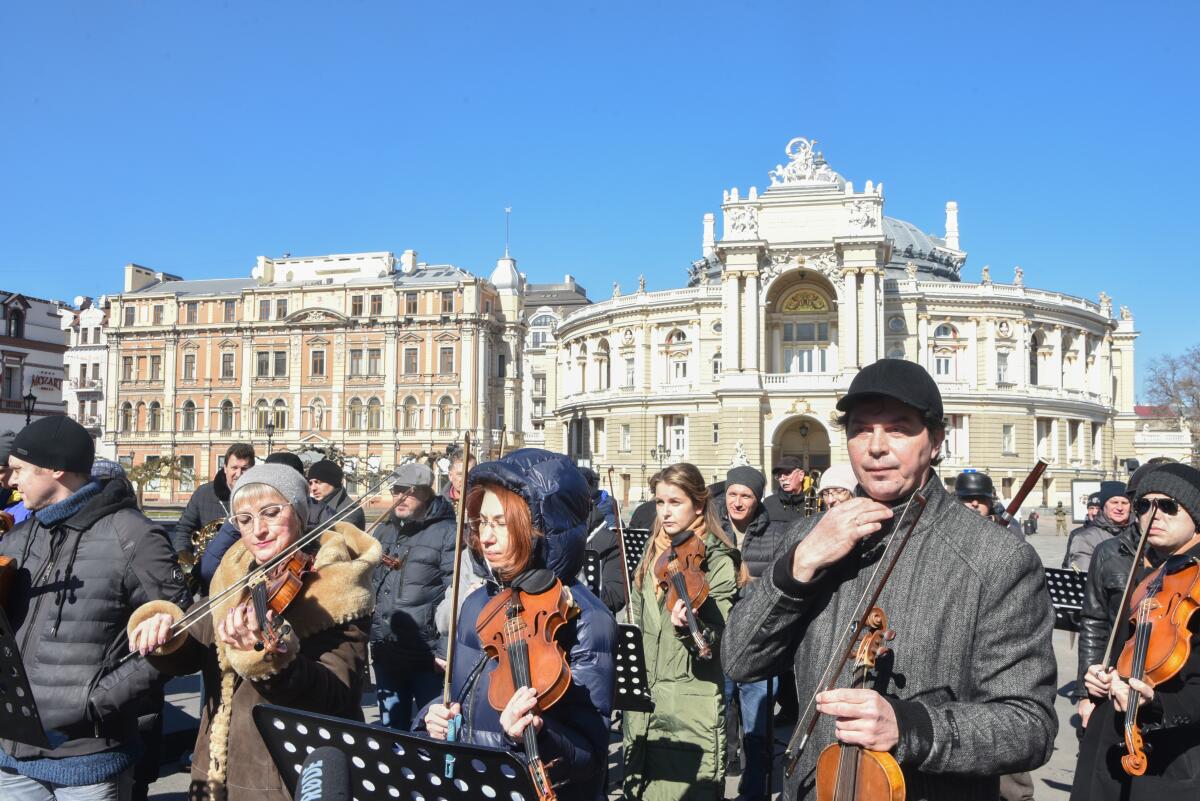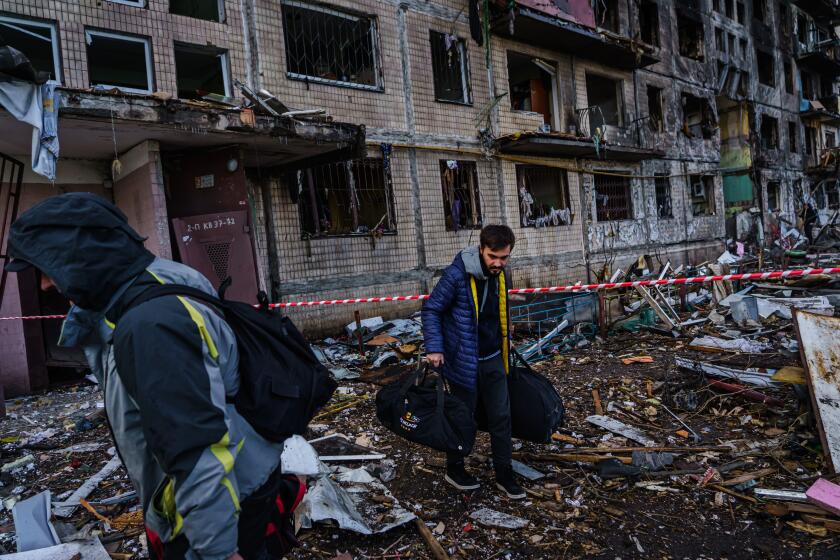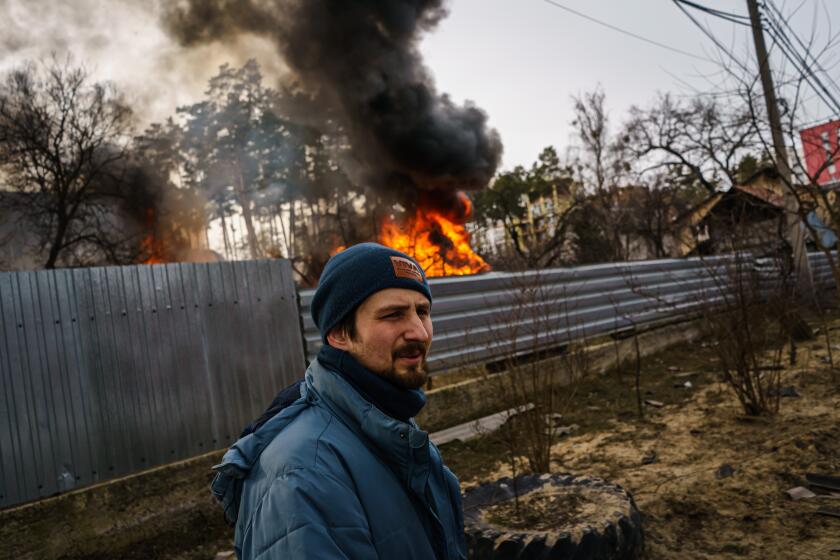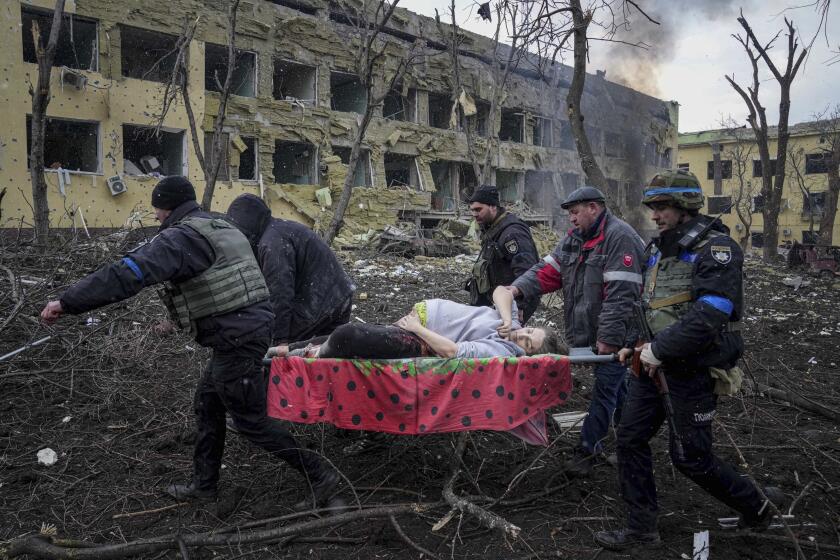In dispatches from Ukraine, one Chinese man attracts love — and hate

- Share via
TAIPEI, Taiwan — Five days after Russia invaded Ukraine, Wang Jixian sat down in front of his phone camera, fresh-shaven and sporting a small Chinese flag on his shirt, to record his final words.
“Good morning. I just got up. It’s March 1, spring has arrived,” he begins, panning his phone to show snow blanketing the ground. “I am in Odesa, Ukraine. Right now it’s 10 in the morning. It’s snowed a lot. We are still alive.”
Two weeks later, he’s still recording.
The 37-year-old programmer, familiar with Ukraine from work trips over the years, had just moved to the southern port city of Odesa in December. As others fled or evacuated in recent weeks, he couldn’t quite bring himself to leave his new home. He figured if he died, it would be with dignity and without regrets.
Instead, Wang’s continuing video diaries have turned him into an internet sensation, as both a rare voice of Chinese solidarity with Ukraine and a lightning rod for the nationalistic, staunchly pro-Russia sentiment dominating China’s web.
His dispatches started the day after Russia attacked. Wang uploaded a short video of himself shopping for food to let friends and family in China know that he was alive and well. Then came the flood of messages wishing him dead.
Russian forces pummeled cities across Ukraine; leaders from the two countries expect to resume talks Tuesday
Chinese viewers, skeptical that Russia had invaded, accused him of treason, of terrorism, of taking U.S. money to act out and spread nefarious lies. On WeChat, the Chinese social messaging app where Wang first posted his videos, they called for his death, or offered to kill him themselves.
The response, driven by a nationalist fervor that venerates Russian leader Vladimir Putin and despises the West, is in part reflective of China’s unique positioning in the war. Chinese officials have called for peace but refused to label the attack an “invasion.” State media amplifies Russian propaganda and blames the U.S. for inciting conflict. On social media, posts opposing the war, Russia or Putin are censored.
For Wang, who is originally from Beijing, it has felt like watching two battles unfold at once. One plays out in air raid sirens and missiles outside his window; the other in frequent attacks and threats on his phone. He is an unwitting enemy in both but says he is afraid of neither.
“If they curse me, I can’t stop them,” he said in a phone interview squeezed between spates of verbal abuse. “If they come here to kill me, I can’t stop them either.”
Initially, Wang was taken aback by the vitriol. He hadn’t considered his content to be extreme or political, just a documentation of what life looked like from Ukraine and a call for peace. After the first video, he continued to post, trying to show the rest of the world what he saw every day.
“You don’t have to comment; just save it in your phone,” he asks viewers in one video. “Someday, when I’m gone, at least people will know we lived. We are not frightened. We are trying to live like people. We will die standing.”
His videos show glimpses of that life. Some days he records the view from his window, silent but for the sound of air raid sirens or blowing wind. Other reels feature activity from the street: trips to the grocery store, a fresh haircut, neighbors walking their dogs or cats wandering around his neighborhood.
Volunteers face grim decisions in Irpin, a suburb of Kyiv, as Russian forces continue their inexorable advance.
When talking to the camera, he’s often upbeat and unassuming, assuring viewers that he is safe and thanking them for their words and care. He’ll smile, joke and talk briefly about what’s happening in Ukraine. But he is also in turns morose, lamenting the daily air raids and wishing for an end to the war.
Sometimes he refutes accusations and rumors about himself. Onscreen, he proclaims his love for China, angling his phone camera with one hand and holding up his passport in the other. He doesn’t oppose the Chinese Communist Party, though he knows his updates from Ukraine don’t align with its propaganda. He doesn’t begrudge his harassers, or the Russian soldiers, or WeChat for temporarily blocking his posts. He has his beliefs, and others have the right to theirs.
His anger is most palpable when responding to pro-war remarks. In one video, he dares those sending hateful messages to come to Ukraine and see it for themselves. If they want to kill him still, they can pick up a knife or gun and do it with their own hands, he says. If not, he will make them dumplings for dinner.
“If I go back, who am I? Am I still Chinese? Or an enemy?” he asks the camera. “Who are we? Traitors? Terrorists? We don’t want to die, we don’t want our wives to die, we don’t want our homes bombed — is this wrong?”
By now Wang has gotten used to the onslaught of voice and text messages, comments and spontaneous calls to curse him and threaten his life. What’s been equally surprising, he said, is the amount of kindness and well wishes he has received too. He tries to respond to everyone who reaches out but has more than 3,000 WeChat messages still to work through. The comments on his videos arrive faster than he can read them. It’s a lot, he says, but heartwarming.
He’s still unsure how it all happened, who was first to share his videos and how it snowballed from there. Before the war, he had 36 subscribers on YouTube, where he has also started posting daily. Now he has nearly 50,000.
A photo of the woman, who was pulled from the rubble of a bombed maternity hospital in the Ukrainian city of Mariupol, was seen around the world.
As his videos have racked up hundreds of thousands of views, Wang said he’s glad to express sympathy and support for Ukrainians, a less than common viewpoint on China’s heavily managed internet.
Still, pockets of dissent have been captured and disseminated before they disappear: photos of lone protesters holding antiwar signs on the streets of China, an open letter from university professors opposing Russia’s invasion, social media posts from celebrities calling for peace.
Amid the surge of pro-Russia voices, and subsequent fears they could endanger Chinese citizens still in Ukraine, internet censors also started scrubbing pro-war or anti-Ukrainian comments that are deemed too extreme.
“If I don’t speak up, everyone, Ukrainians will think all Chinese have this view. So I’m saying something different, to tell them there are Chinese people who want to help you, who donate money, who support you,” Wang said. In the comments on his videos, viewers leave their own messages of encouragement for him and Ukraine.
Wang said his goals change depending on the day. Some days he simply reports his safety; other times he wants to refute fake reports about what’s happening in the war. He hopes he can maybe change someone’s mind about the war, by posing questions in his video or sharing what he has seen. The money people send him he returns, asking them to donate it to the National Bank of Ukraine instead.
For now, he plans to keep posting until the war is over. Back in Beijing, his parents have asked him to stop, worried that he’s making trouble for himself. He knows it’s hard for them to understand why he continues on the way he does. For the most part, though, he’s satisfied with what has been said.
“As of today, I feel I’ve pretty much completed what history requires from a nobody like me,” he said. “Hopefully history’s next steps don’t need me.”
More to Read
Sign up for Essential California
The most important California stories and recommendations in your inbox every morning.
You may occasionally receive promotional content from the Los Angeles Times.














